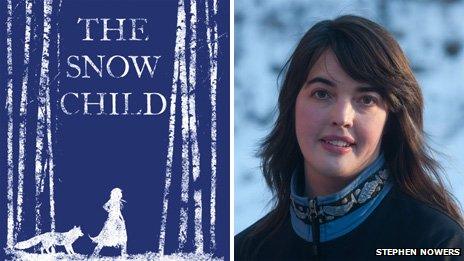Eowyn Ivey on how she made The Snow Child
- Published

Eowyn Ivey was inspired to write her first novel, The Snow Child, after she chanced upon a version of a classic Russian fairy-tale in the bookshop where she works.
The US-born author describes it as a fateful moment.
Ivey, who was raised in Alaska, was named after a character from JRR Tolkien's Lord of the Rings by her mother.
Prior to becoming a bookseller, she worked for many years as a newspaper reporter.
Last month she was included on the Waterstones 11, external list of new writers for 2012.
The Snow Child is set in the harsh wilderness of Alaska in 1920, where a couple - Jack and Mabel - sculpt a child out of snow.
After the snow child disappears, the couple begin to see a mysterious young girl, called Faina, running wild among the trees.
The novel draws on Ivey's own experiences of living in Alaska, where she and her family grow their own food and hunt caribou, moose and bear for meat.
Did being named after a character in The Lord of the Rings shape you as a reader and a writer?
I think it was an indicator that my mum loves books. Reading and talking about writing was so much a part of my life as I was growing up.
How did you come across the fairy story that inspired The Snow Child?
I was shelving books at the store one winter evening and I came across this little inexpensive children's paperback. It was illustrated very simply with just a couple of sentences on each page.
As I read it I got this tingly sensation that I had found the story I had been looking for.
I felt a sense of fate or destiny. I'd always wanted to tell a magical story set in Alaska, but I hadn't found the way to get it.
I'd been working on a different novel for almost five years, so I set it aside and started writing The Snow Child.
The novel's sense of mystery and unease is partly down to the lack of speech marks when Faina speaks. Why did you take that approach?
When I very first started doing dialogue for Faina, it felt too clunky when I put the quote marks around it. So then I experimented and eventually I went with it only when she is present.
But I've had some people say to me, 'You know there are some typos in your book?' [laughs]
To what extent do the hardships of Jack and Mabel living in the wilderness reflect the kind of life you live?
There are definitely some similarities. The difference is that my husband and I choose that lifestyle.
We were raised in a way that we hunt for our own meat, grow a vegetable garden and have chickens.
But we're not anywhere like Jack and Mabel where it's a dire situation and we have to make it work. We've got credit cards and grocery stores and roads.
Growing up I loved the Little House on the Prairie books, so I was inspired by the notion of people trying to earn their way in the hard landscape.
You actually hunt bears?
The one bear that I've shot myself was in our yard, so it wasn't a big hunting adventure.
That has been an aspect that I've been a little trepidatious about. I wasn't sure how it would be received by people who live outside of Alaska.
People who live in Alaska, even those who don't hunt, are very grateful if someone gives them a moose steak.
But I know that's not typical around the world, so I've been wondering how people are going to react.
The savagery of nature and the element of hunting seem ever present in the novel.
That was what excited me when I found the fairy-tale. Not just that it was a magical tale set in a land like Alaska, but that rub of two very different textures excited me as a writer - the ethereal next to the gritty.
What's your relationship with snow? You must be surrounded by it for much of the year?
I love snow. There are Alaskans who have bumper stickers that say 'I hate snow' and I think, 'Why are you living in Alaska?'
We have snow maybe nine months of the year. I do love it. We have a great sledging hill in our yard.
Does working in the bookshop, being surrounded by books, influence you as a writer?
I had someone ask me once if I found it intimidating realising how many books are out there, but I feel the opposite.
It's a really exciting place to work, partly because of the kind of customers that come into the bookstore. It's a very creative, stimulating place.
Is your next novel set in Alaska?
It's very early on and I never know if it's going to work or not, but I think it will share some similarities with The Snow Child - set in historical landscapes with fantastical elements.
But I would like to do something a little more adventurous and epic, so we'll see where it takes me.
The Snow Child is published by Headline Review and will be BBC Radio 4's Book at Bedtime from 2 April.